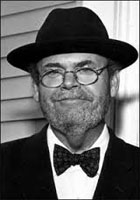Thomas Lynch
Thomas Lynch Poems
Because he barely heard the voice of God
above the hum of other choristers—
batwing and bird-whistle, gathering thunder,
the hiss of tides retreating, children, cattle;
...
The body of the boy who took his flight
off the cliff at Kilcloher into the sea
was hauled up by curragh-men, out at first light
fishing mackerel in the estuary.
...
He'll have been the last of his kind here then.
The flagstones, dry-stone walls, the slumping thatch,
out-offices and cow cabins, the patch
of haggard he sowed spuds and onions in—
...
On shanks' mare Argyle talked to himself.
Alone, he'd carry on whole colloquies
en route to some poor corpse's obsequies—
these dialogues, the way he kept his wits
...
The one who pulled the trigger with his toe,
spread-eagled on his girlfriend's parents' bed,
and split his face in halves above his nose,
so that one eye looked east, the other west;
...
Thomas Lynch Biography
Essayist, poet, and funeral director Thomas Lynch has written four critically acclaimed volumes of poetry, three award-winning volumes of essays, and a book of short fiction. By using his own daily routine as poetic fodder, Lynch has transformed the mundane task of preparing the dead into a life-affirming event. His lyrical, elegaic poems describe the dead citizens of Milford, Michigan, his own family relationships, and scenes and myths from his Irish Catholic upbringing. Sometimes described as a cross between Garrison Keillor and W.B. Yeats, Lynch’s work dissects the vicissitudes of the human experience with grace and wit. His first collection of poems, Skating with Heather Grace (1986), is set in Michigan, Ireland, and Italy. Library Journal reviewer Rosaly DeMaios Roffman found that the poems "unpretentiously rehearse the dreams of the dying as they celebrate the everchanging relationships of the living." Lynch, according to Roffman, crafts poems that weave symbolism and mythology into the human experience. Lynch’s subsequent volumes of poetry, including Grimalkin and Other Poems (1994), Still Life in Milford (1998), Walking Papers (2010), and The Sin-Eater: A Breviary (2011), likewise contain elements of the poet's professional and personal life mixed with his ruminations about Irish culture and history. A well-known essayist and contributor to publications like the New York Times, the London Times, Newsweek, and Harper’s, Lynch’s essays offer a fascinating peak into a profession few of us have ever imagine. The Undertaking: Life Studies from the Dismal Trade (1997) reflects the author's "eloquent, meditative observations on the place of death in small-town life," according to a critic in Kirkus Reviews. Lynch's poetic vision is indelibly colored by his undertaking business, and what he sees often contrasts with what lies on the surface. Dispelling the myths about people in his trade, Lynch wrote, "I am no more attracted to the dead than the dentist is to your bad gums, the doctor to your rotten innards, or the accountant to your sloppy expense records." His profession has provided Lynch not only with a living, but with a unique vantage point from which to observe the entire cycle of life. The book won the Heartland Prize for Non-Fiction, the American Book Award, and was a finalist for the National Book Award. Lynch's prose book Bodies in Motion and at Rest: On Metaphor and Mortality (2000) explores his Roman Catholic childhood and family, being a father, and the relationship between "mortuary and literary arts." In 2005 Lynch published Booking Passage: We Irish and Americans, a memoir-travelogue and cultural exploration of the ties that bind two countries with inextricably linked histories. His foray into short fiction, Apparition and Late Fictions (2010) addresses themes found in his poetry and essays, offering sensitive portraits of ordinary people coping with grief. Lynch has received numerous awards and grants from the National Book Foundation, the National Endowment for the Arts, the Michigan Council for the Arts and the Irish Arts Council. A frequent guest lecturer at universities across North America, the United Kingdom, Ireland and Australia, he is an adjunct professor in creative writing at the University of Michigan-Ann Arbor. He divides his time between his home in Milford, Michigan and his ancestral home in Moveen, County Clare, Ireland.)
The Best Poem Of Thomas Lynch
Argyle on Knocknagaroon
Because he barely heard the voice of God
above the hum of other choristers—
batwing and bird-whistle, gathering thunder,
the hiss of tides retreating, children, cattle;
because he could not readily discern
the plan Whoever Is In Charge Here has,
he wondered about those who claimed to have
blessed assurances or certainty:
a One and Only Way and Truth and Life,
as if Whatever Breathes in Everything
mightn't speak in every wondrous tongue;
as if, of all creations, only one
made any sense. It made no sense to him.
Hunger he understood, touch, desire.
He knew the tenderness humans could do,
no less brutalities. He knew the cold
morning, the broad meadow, the gold sunset.
One evening on the hill of Knocknagaroon,
the Atlantic on one side, the Shannon
on the other, the narrowing headlands
of the peninsula out behind him,
the broad green palm of Moveen before him,
it seemed he occupied the hand of God:
open, upturned, outstretched, uplifting him.
